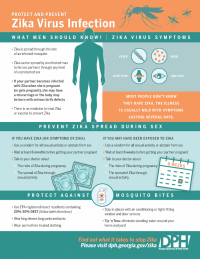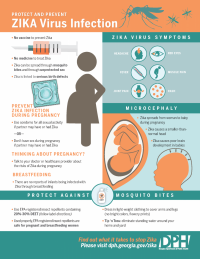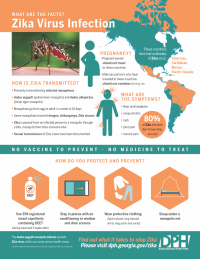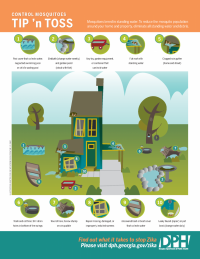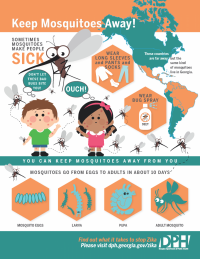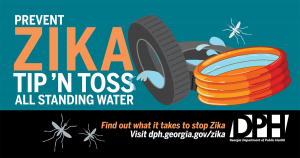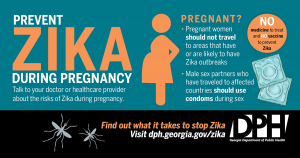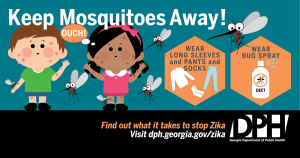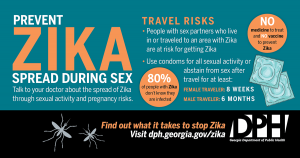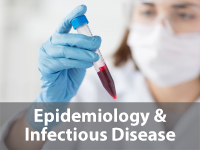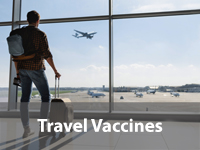Zika Virus
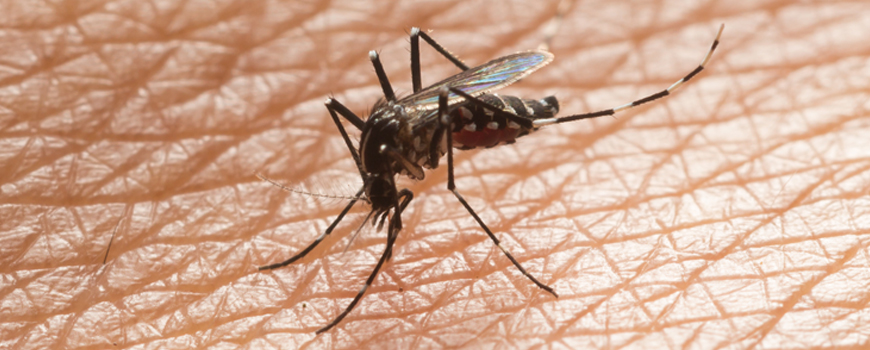
What is the Zika Virus?
Though Zika is new to North and South America, the virus has been recognized since the 1940s. Zika was first observed in primates in Uganda in 1947 and the first case of the virus in humans was in 1952. The disease spread across Africa to Asia, but due to the mild symptoms of the virus, outbreaks may have occurred without any record. While the symptoms of Zika may be mistaken for other illnesses, most people infected with Zika do not show symptoms and never even know they are sick.
Zika is primarily spread through the bite of an infected Aedes mosquito, the same mosquito known to spread chikungunya and dengue. The virus can also spread from person to person via sexual contact and can pass from a pregnant woman to her child.
As of February, 2016, Zika is a Public Health Emergency of International Concern as declared by the World Health Organization. Georgia Department of Public Health and North Central Health District urge everyone to take steps to prevent the spread of Zika, especially during Georgia’s mosquito season (April – November). Pregnant women, women who may become pregnant, and travelers to areas with active Zika transmission are encouraged to take extra precaution.
Methods of Transmission
Mosquitoes
The most common method of Zika transmission is from the bite of a mosquito that is carrying the disease after feeding on an infected person. There are two species of mosquitoes known to carry the virus, Aedes aegypti and Aedes albopictus, which can also spread dengue and chkungunya. These mosquitoes are are more active during the day, but can still bite at night.
These mosquitoes can lay eggs in very small amounts of water, so it is important for people to get rid of standing water around their homes and get rid of anything that can collect water.
Sex
Zika can spread from an infected person to a non-infected person through many forms of sexual contact, even if the infected person does not show any symptoms. Infected men have a longer time frame in which they can spread Zika through sex because the virus can stay in semen longer than in vaginal fluids, urine, blood or other bodily fluids.
Mother to Child During Pregnancy
If a woman becomes pregnant or is pregnant when she is infected with Zika, there is a high risk that the child will become infected as well. Zika is very dangerous to a developing fetus and has been associated with microcephaly and brain damage in infants born to mothers who had Zika during pregnancy.
Blood Transfusion
In theory, a person who receives infected blood via blood transfusion would then be infected with the virus. There have been no confirmed cases of Zika from blood transfusions in the United States. Brazil has reported several cases which are being investigated.
Symptoms & Treatment
Symptoms
Zika is difficult to spot because only four out of five people infected will not experience any symptoms of the virus. If symptoms do appear, they are usually mild and last between several days to a week before recovery.
Symptoms are similar to those of many other illnesses, making Zika difficult to identify. These symptoms include:
- Headache – Zika can cause mild headaches and sensitivity to light
- Conjunctivitis – Eyes can appear bloodshot and my be itchy
- Fever – Fevers caused by Zika rarely reach temperatures above 102° F
- Rash – An itchy pink rash can appear in various areas of the body
- Joint Pain – Elbows, shoulders and knees can feel pressured and sore
- Sore Muscles – Muscles throughout the body may feel tense or strained
If you think you have Zika:
- Contact your doctor or other healthcare provider about testing.
- Treat the symptoms if they appear.
- Take steps to protect others from Zika.
Treatment
There is currently no vaccine to protect against Zika, nor is there a cure for anyone infected with the virus. Treating the symptoms of Zika is similar to treating a severe cold:
- Drink plenty of fluids – Staying hydrated is important during any sickness, especially if fever is involved. Avoid caffeinated drinks – they can worsen dehydration.
- Stay home and rest – Sleep can help your immune system fight off illness and staying indoors can prevent contact with mosquitoes.
- Treat fever and pain with medicine – Acetaminophen can be used to treat fever, pain and soreness. In rare occasions these medications can lead to a rash.
- Avoid aspirin and NSAIDs – Do not use aspirin, ibuprofen or other non-steroidal anti-inflammatory medicine before speaking to a healthcare provider.
- Talk to you healthcare provider about medication – If you take prescription medication for another condition, speak to your doctor before taking any more medicine.
Protection & Prevention
Protect Against Mosquitoes
Mosquitoes are the primary method of spreading Zika, so it is important to not only protect yourself from mosquito bites, but to help control the mosquito population. You can help protect against mosquitoes with these tips:
- Use EPA-resgistered insect repellents that contain 20%-30% DEET and follow instructions on the label.
- Cover skin by wearing long sleeves, long pants and socks outdoors.
- Treat clothing with permethrin or wear pre-treated clothing.
- Stay indoors with air conditioning or tight-fitting windows and door screens.
- Tip ‘n Toss: Get rid of standing water and throw away anything around you yard that can collect water.
- Treat water you cannot get rid of with larvicide available at your local health department.
Prevent Sexual Transmission
You can help reduce the risk of Zika transmission between partners by practicing safe sex. Zika can spread from people that do not show symptoms and can spread before and after they do show symptoms. To prevent sexual transmission:
- Use condoms properly to reduce the chance of infection.
- Reduce the risk of Zika infection by not sharing sex toys between partners.
- Abstinence completely eliminated the risk of Zika infection through sex.
Avoid Travel to Active Zika Areas
As of March 2017, the only recorded cases of Zika in Georgia are all travel-related. It is recommended to avoid travelling to active Zika areas, especially for pregnant women or women who may become pregnant. If you have to travel to these areas, it is important to take precautions to prevent mosquito bites and sexual transmission.
Zika & Pregnancy
How Zika Affects Pregnancy
A woman who is infected with Zika before or during a pregnancy is at high risk of passing the virus from herself to the developing fetus. Zika can lead to a variety of brain and birth defects including microcephaly which is characterized by smaller-than-normal head and brain. Children born with Zika may not show any effects at birth, but may experience defects later.
Zika Advice for Women
For pregnant women:
- Pregnant women should not travel to active Zika areas.
- Use EPA-registered insect repellents that contain 20%-30% DEET – these repellents are safe for pregnant and breastfeeding women when used properly.
- Use condoms correctly for all sexual contact if your partner may be infected or may have been exposed to Zika.
- Do not have sex while pregnant.
For women considering pregnancy:
- Talk to your doctor about the risk of Zika infection and your partner’s potential exposure to Zika.
For women planning to avoid or delay pregnancy:
- Talk to your healthcare provider about birth control options that fit your lifestyle.
Zika Advice for Men
For men who have Zika or its symptoms:
- Use a condom correctly for all sexual activity or abstain from sex.
- Wait 6 months before getting you partner pregnant.
- Talk to your doctor about how Zika is spread sexually and the risks of Zika during pregnancy.
For men who may have been exposed to Zika:
- Use a condom correctly for all sexual activity or abstain from sex.
- Wait 8 weeks before getting you partner pregnant.
- Talk to your doctor about how Zika is spread sexually and the risks of Zika during pregna
Zika & Travelers
Travel Recommendations
It is recommended to avoid travel to any areas with active Zika outbreaks. As of March 2017, all cases of Zika in Georgia are travel-related. If you must travel to any active Zika areas, it is important to plan ahead.
Before Traveling
- Create a Zika prevention kit.
- Review CDC’s travel notices.
During Your Trip
- Use EPA-approved insect repellent containing 20%-30% DEET.
- Apply sunscreen before using insect repellent.
- Cover skin by wearing long sleeves, long pants and socks.
- Stay in areas with air conditioning and with windows and door screens.
- Use a mosquito net if sleeping outdoors or in a room without screens or air conditioning.
- Practice safe sex using condoms correctly or abstain from sex.
After Travelling
- Continue to protect yourself against mosquitoes.
- Practice safe sex, especially if returning from active Zika areas, or abstain from sex.
- If you develop symptoms, or believe you may have been exposed to Zika, consult a healthcare professional and find out if you need to be tested for the virus.
More Information
Learn about our related health services:


 Contact Us
Contact Us Locations
Locations Job Openings at North Central Health District
Job Openings at North Central Health District Internships
Internships Board of Health
Board of Health Cost and Insurance
Cost and Insurance Privacy Policy
Privacy Policy Teens & Adults
Teens & Adults For Children
For Children Other Programs
Other Programs County Environmental Health Offices
County Environmental Health Offices Chemical Hazards
Chemical Hazards Tourist Accommodations
Tourist Accommodations Food Service
Food Service Rabies Control
Rabies Control Lead Poisoning Prevention
Lead Poisoning Prevention Body Art
Body Art Land Use
Land Use Swimming Pool Program
Swimming Pool Program Water Testing for Private Wells
Water Testing for Private Wells Environmental Health Complaints
Environmental Health Complaints Georgia Food Recall Alerts
Georgia Food Recall Alerts Personal & Family Preparedness
Personal & Family Preparedness Emergency Preparedness for Functional & Access Needs
Emergency Preparedness for Functional & Access Needs Severe Weather Preparedness
Severe Weather Preparedness Emergency Preparedness Training
Emergency Preparedness Training Medical Reserve Corps
Medical Reserve Corps Regional Healthcare Coalitions
Regional Healthcare Coalitions Strategic National Stockpile/Medical Countermeasures
Strategic National Stockpile/Medical Countermeasures